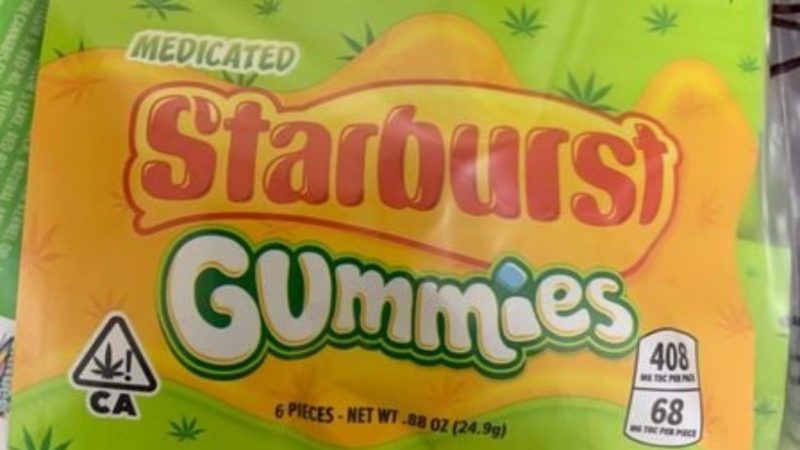News Outlets Are Increasingly Skeptical of Warnings About Marijuana Edibles in Trick-or-Treat Bags
Although the Halloween scare stories continue, journalists are starting to recognize the lack of evidence to support this mythical menace.

The mythical menace of THC-infused Halloween candy continues to haunt police departments and news outlets across the country, as Reason's Lenore Skenazy notes. But a review of recent press coverage suggests that journalists are starting to wise up.
In 2014, after Denver police told parents to be on the lookout for marijuana edibles in their kids' trick-or-treat bags, I searched for evidence that anything like that had ever happened and found none. Since 1996, the year that California became the first state to legalize marijuana for medical use, drug warriors and their credulous collaborators at newspapers and TV stations have repeatedly warned parents that seemingly friendly strangers might be trying to get their kids high on Halloween by passing off THC-infused candy as ordinary treats. Yet none of those stories cited any actual examples.
Even the 2019 case mentioned in the scare story that Yahoo! News ran this week does not really count as a fulfillment of those dark prophecies. Last November, The Day, a Connecticut newspaper, reported that Waterford police "found two kids under the age of 18 had each received two sealed packages of…'Shake & Baked Kitchen' gummies." This incident did not look like an attempted prank, since "the packages stated that each bag contained 10 gummies with a corresponding THC level of 10 mg per gummy." The Day noted that "no one ingested the candies and no injuries have been reported." The paper added that "it was not clear if the candy was intentionally handed out or was an unintentional oversight by the owner."
Another 2019 Halloween scare likewise was not what it seemed. "North Carolina drug investigators allegedly seized 200 pieces of marijuana-infused Halloween candy from a South Carolina man," the CBS station in Greenville reported. It described the seizure as "200 Nerds Rope candies allegedly infused with THC," presumably a doctored version of this product. The station added that "detectives think the candy was going to be distributed at college parties and said there's 'no reason to believe it was intended to be distributed to young children trick or treating.'"
This year there has been no shortage of stories alerting parents to a danger that has never been documented and never made much sense, since substituting expensive marijuana edibles for cheap candy from Walmart or Target offers no obvious payoff even for maliciously minded stoners: If anyone managed to trick kids into eating medicated munchies, he would not be around to witness the effects. After two decades of this nonsense, however, the implausibility of the warnings and the lack of evidence to support them are starting to penetrate. On Monday, the Indiana State Police posted a Facebook warning that was covered by several news outlets, at least one of which showed appropriate skepticism.
"Parents, here is an example of what to look for in your child's Halloween candy this year," the Facebook message said. "These were seized just this past weekend by one of our Troopers from the Lowell post. While they are packaged and marketed to look like candy, they are not. You have to look closely to see the 'Medicated' wording. Please thoroughly check all candy and don't assume it's 'OK' just because it looks 'OK.'"
The pictures accompanying the post showed bags of "Medicated Starburst Gummies" and "Medicated Sour Skittles" from California. These are knockoffs of the familiar brands, and Mars Wrigley, which makes both products, is not happy about that. But despite the superficial resemblance, both packages are clearly labeled as marijuana products: In addition to the word medicated, the bags are speckled with cannabis leaves and have state-mandated labels indicating the nature of the product and the THC content. In any case, as usual, there was no indication that anyone planned to pass out the candy to children.
While outlets such as Fox News echoed the scaremongering, the ABC station in Chicago offered this caveat in the second paragraph of its story: "In the past, people have been worried about poisoned or contaminated Halloween candies. Those fears were unfounded. There has actually never been a single confirmed case of a trick-or-treater being poisoned by candy." The last paragraph added this: "There have been no confirmed cases of kids getting marijuana edibles in their Halloween candy. But Indiana police wanted to make sure you check your kids' candy anyway." The NBC station in Indianapolis was less wary, although it noted that "there's no evidence the person booked for possessing the medicated candies had any intention of giving them to children."
In addition to such notes of caution, straightforward debunkings are becoming more common, not just in alternative papers like the East Bay Express but also in more mainstream publications. "No One's Going to Give Your Kids Free Weed in Their Halloween Candy," said the headline over an October 2019 Slate piece by Jane C. Hu, who noted, "There are no actual reports of this ever happening." A week later, the Washington Examiner ran an opinion piece by freelance writer Tom Joyce with the same message: "No one is giving your children marijuana candy this Halloween." Around the same time, NBC News ran an essay by Simon Moya-Smith with this headline: "The Halloween tale of marijuana handed out to trick-or-treaters is as real as a ghost story." This month the Spokane Spokesman-Review noted that "tainted treats turn out to be mostly make-believe."
It looks like people are beginning to understand that the risk of THC in their kids' trick-or-treat haul is about as plausible as the risk of razor blades in apples or needles in chocolate bars. But given the apparently inexhaustible demand for Halloween horror stories, some other menace probably will take its place.
